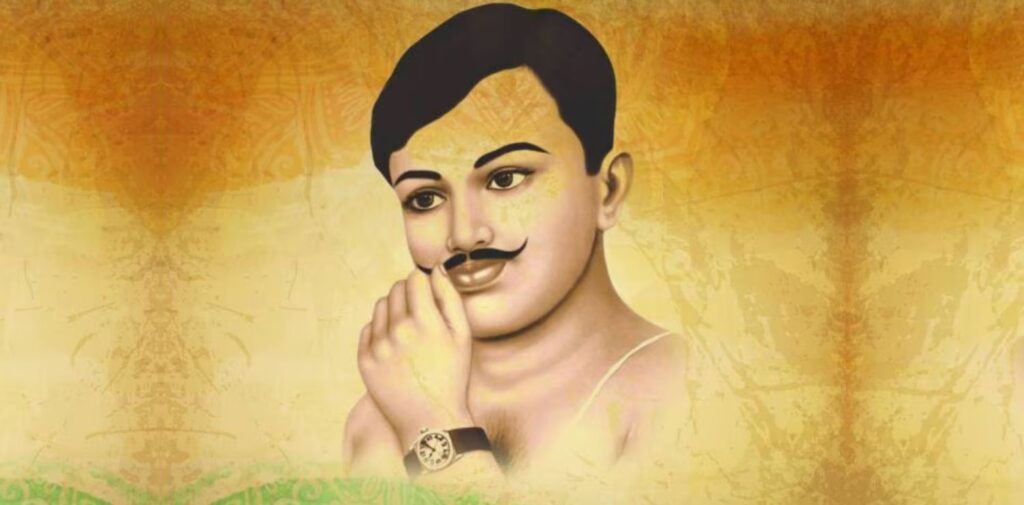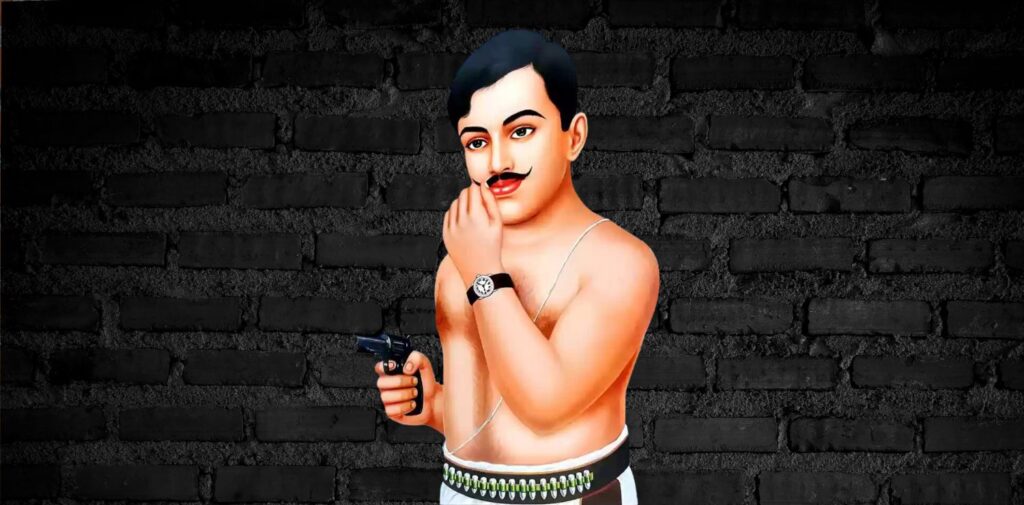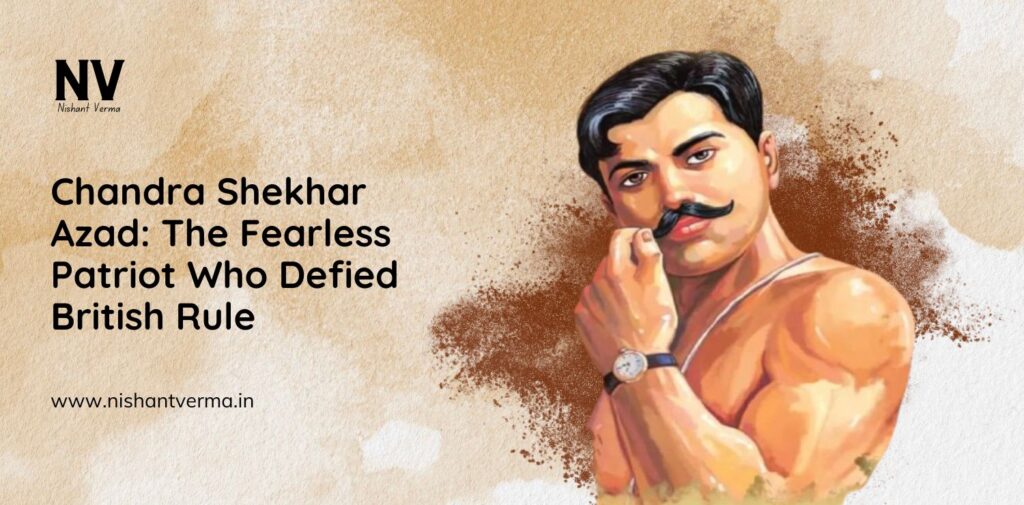As India celebrates its hard-won independence, we honor the countless freedom fighters who gave their lives for the cause. Among these, Chandra Shekhar Azad stands out as a towering figure whose life was marked by an unwavering commitment to the nation’s freedom. His name is synonymous with courage, sacrifice, and the spirit of defiance against the British Empire. Unlike those who later claimed to have fought for India’s freedom but did little more than negotiate with the colonial powers, Azad’s life was one of action, bravery, and true patriotism. His contribution to India’s independence is immense, and his legacy continues to inspire generations of Indians.
Early Life: The Making of a Revolutionary
Chandra Shekhar Azad was born as Chandra Shekhar Tiwari on July 23, 1906, in Bhavra, a small village in the Alirajpur district of present-day Madhya Pradesh. From an early age, Azad displayed an unusual sense of justice and courage. The son of Sitaram Tiwari and Jagrani Devi, his upbringing was steeped in the traditions and values of his Brahmin family, but it was the prevailing political climate of colonial India that truly shaped his worldview.
Azad’s first brush with revolutionary activities came at a young age. When he was just 15, he was deeply influenced by the Jallianwala Bagh massacre of 1919, where hundreds of unarmed Indians were killed by British troops. This event ignited a fire of rebellion within him. He joined the non-cooperation movement led by Mahatma Gandhi in 1921, marking the beginning of his journey as a freedom fighter. However, his path soon diverged from that of the mainstream Congress leadership.
After being arrested for participating in the movement, he was asked his name by the British magistrate. With characteristic defiance, he declared his name to be “Azad” (meaning “free”), his father’s name as “Swatantrata” (freedom), and his residence as “Jail.” From that moment on, he was known as Chandra Shekhar Azad—a name that would become a symbol of resistance against British rule.

The Birth of a Revolutionary Leader
Disillusioned by the Congress Party’s decision to call off the non-cooperation movement after the Chauri Chaura incident, where a violent clash resulted in the deaths of policemen, Azad sought more direct methods to challenge the British Raj. He joined the Hindustan Republican Association (HRA), a revolutionary organization founded by Ram Prasad Bismil. The HRA was committed to achieving complete independence from British rule through armed struggle, a goal that resonated deeply with Azad’s militant ideals.
Azad quickly rose through the ranks of the HRA due to his daring and leadership abilities. He was involved in several revolutionary activities, including fundraising for the movement through means that the British labeled as criminal but which Azad and his comrades saw as justified acts of rebellion. He played a significant role in the famous Kakori Train Robbery of 1925, a daring attempt to loot a government treasury train to fund the revolutionary activities of the HRA. This act not only challenged British authority but also demonstrated the growing boldness of the Indian revolutionary movement.
Azad’s leadership was marked by his commitment to discipline, secrecy, and the welfare of his comrades. He was known for his strict moral code and his refusal to harm innocent civilians, a principle that earned him the respect and loyalty of those who fought alongside him. Under his leadership, the HRA evolved into the Hindustan Socialist Republican Association (HSRA), reflecting a broader ideological shift towards socialism and the goal of establishing an independent, egalitarian society in India.
Chandra Shekhar Azad’s Real Contribution: The Spirit of Defiance
Chandra Shekhar Azad’s contribution to India’s independence struggle cannot be measured merely by the number of revolutionary activities he was involved in. His real contribution lies in the spirit of defiance and sacrifice that he embodied. Unlike some leaders who engaged in negotiations with the British, often at the cost of compromising on the demand for complete independence, Azad’s approach was uncompromising. He believed in the necessity of armed resistance and was ready to lay down his life for the cause.
Azad’s most significant contribution was his role in inspiring a new generation of revolutionaries. Alongside Bhagat Singh, Sukhdev, and Rajguru, he was a central figure in the HSRA, which carried out several high-profile attacks on British officials and institutions. These actions, while often condemned by the British and even by some moderate Indian leaders, were intended to send a clear message: that the Indian people would no longer accept colonial subjugation without a fight.
One of the most notable actions under Azad’s leadership was the assassination of John Saunders, a British police officer involved in the death of Lala Lajpat Rai, a prominent nationalist leader. The HSRA, led by Azad and Bhagat Singh, viewed this act as a direct response to the brutal suppression of Indian protestors and as a way to avenge the death of a respected leader. This act of retaliation, while controversial, was seen by many as a bold stand against the tyranny of British rule.
Azad’s commitment to the cause was absolute. He lived his life on the run, constantly evading the British police, yet never wavering in his resolve. He knew that his path was fraught with danger and that his chances of survival were slim, but he embraced this reality with courage. He famously declared that he would never be captured alive by the British, a promise he kept until his last breath.

The Ultimate Sacrifice: Azad’s Martyrdom
Chandra Shekhar Azad’s life came to a heroic end on February 27, 1931, in Alfred Park (now Azad Park) in Allahabad. Betrayed by an informant, he found himself surrounded by British police. True to his vow of never being taken alive, Azad fought valiantly until the last bullet. When only one bullet remained, he used it to end his own life, ensuring that the British would never capture him. His death was a blow to the revolutionary movement, but it also immortalized him as a martyr for the cause of Indian independence.
Azad’s martyrdom was more than just the death of a revolutionary; it was a powerful statement against colonial oppression. In taking his own life rather than surrendering, Azad demonstrated the ultimate form of defiance. His death inspired countless others to continue the fight for independence, proving that the spirit of resistance would not be extinguished by the death of any single individual.
The Unsung Hero: The Truth Behind the Myth
While Chandra Shekhar Azad is revered as a hero by many, there has been a deliberate attempt by some to downplay his contributions to India’s independence. In the narrative propagated by certain factions, the contributions of revolutionaries like Azad have been overshadowed by those who advocated for more moderate or non-violent approaches. This revisionist history often paints these revolutionaries as reckless or misguided, failing to acknowledge the vital role they played in keeping the flame of freedom alive during some of India’s darkest days.
This attempt to rewrite history serves to glorify certain leaders while diminishing the sacrifices of others. The truth is that without the efforts of Azad and his fellow revolutionaries, the struggle for independence would have lacked the urgency and the fearlessness that ultimately forced the British to leave India. The revolutionaries’ willingness to confront the British with direct action kept the pressure on the colonial government and made it clear that the Indian people would not be content with anything less than complete independence.
It is important to recognize that the struggle for India’s independence was multi-faceted, involving both peaceful protests and armed resistance. While figures like Mahatma Gandhi advocated for non-violence, it was the actions of revolutionaries like Azad that demonstrated to the British that the demand for independence was not just a matter of political debate but a life-and-death struggle for the Indian people. Azad’s life and sacrifice are a testament to the fact that freedom is often won through the blood and sweat of those willing to take the ultimate risk.

The Legacy of Chandra Shekhar Azad: A True Patriot
Chandra Shekhar Azad’s legacy is one of unwavering patriotism and relentless pursuit of justice. He was a man who lived and died for his country, refusing to compromise his principles or his mission. His life serves as a reminder that the fight for freedom is not always straightforward or peaceful; it often requires sacrifices that are beyond the comprehension of those who have never had to live under the yoke of oppression.
Azad’s story is not just a chapter in India’s history; it is a lesson in what it means to be truly free. His defiance against the British was not born out of a desire for power or recognition but out of a deep love for his country and a burning desire to see it free from foreign rule. He understood that freedom could not be handed over on a silver platter; it had to be fought for, even if that fight cost him his life.
As we celebrate India’s independence, it is crucial to remember the contributions of Chandra Shekhar Azad and the many others like him who laid down their lives for the cause. Their sacrifices are the foundation upon which our nation stands today. While some may seek to downplay or rewrite their contributions, the truth remains that without their bravery, India’s path to independence would have been much longer and more arduous.
Conclusion: A Call to Remember the True Heroes
Chandra Shekhar Azad’s life is a powerful reminder of the real cost of freedom. As we look back on India’s struggle for independence, it is important to honor not just those who are celebrated in mainstream history but also those who have been sidelined or forgotten. Azad’s life and sacrifice are emblematic of the many unsung heroes whose stories deserve to be told.
On this Independence Day, let us pay tribute to Chandra Shekhar Azad, the fearless son of Bharat Mata, who fought not for fame or fortune but for the freedom of his motherland. His legacy is a challenge to all of us to remain vigilant in defending our freedoms and to remember that the spirit of resistance is the true essence of patriotism. In celebrating Azad, we celebrate the indomitable spirit of India, a spirit that refuses to be shackled by oppression and that will continue to fight for justice and freedom for all.




